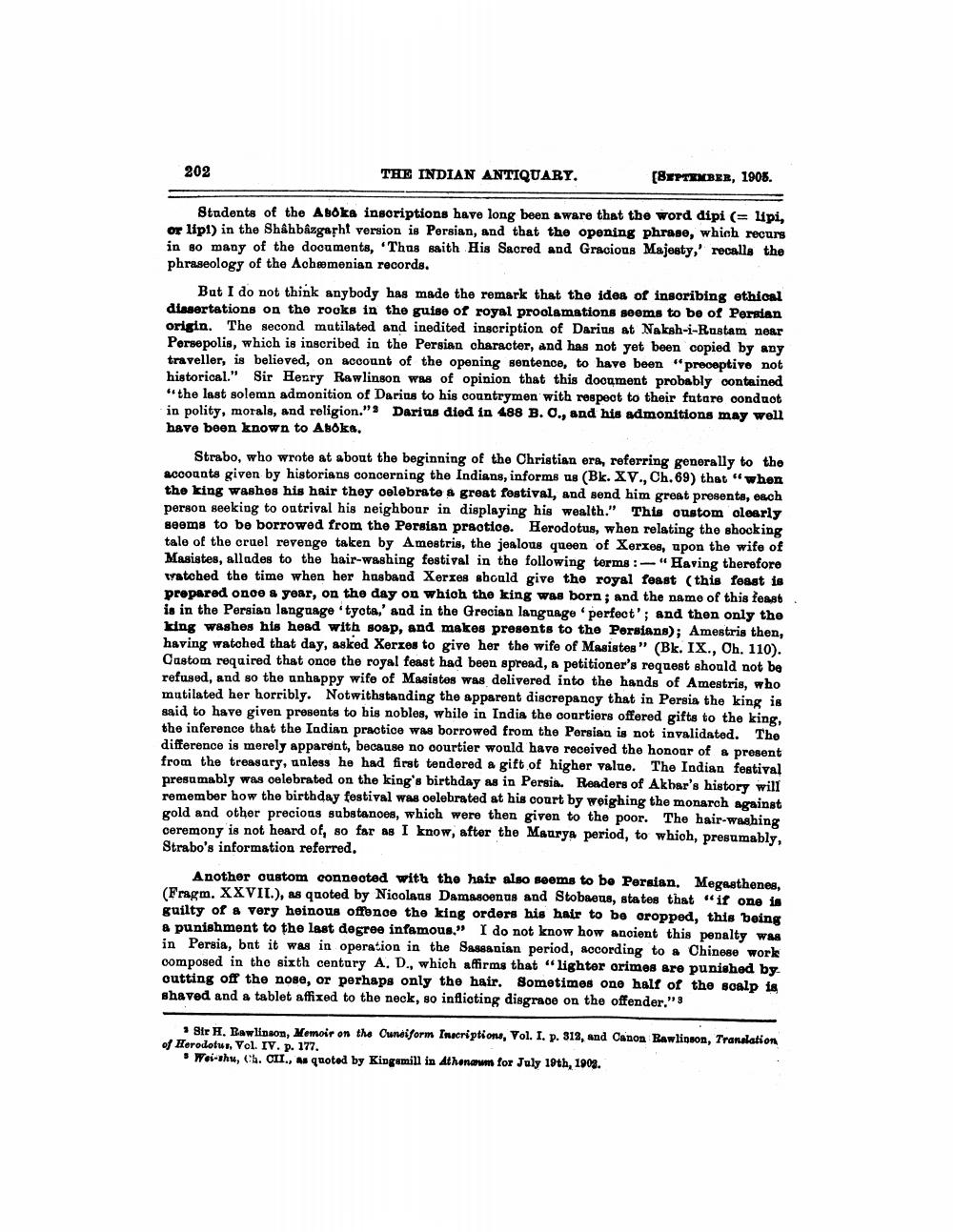________________
202
THE INDIAN ANTIQUARY.
Students of the Asoka inscriptions have long been aware that the word dipi (= lipi, or lip!) in the Shahbâzgarht version is Persian, and that the opening phrase, which recurs in so many of the documents, 'Thus saith His Sacred and Gracious Majesty,' recalls the phraseology of the Achaemenian records.
[SEPTEMBER, 1905.
But I do not think anybody has made the remark that the idea of inscribing ethical dissertations on the rocks in the guise of royal proclamations seems to be of Persian origin. The second mutilated and inedited inscription of Darius at Naksh-i-Rustam near Persepolis, which is inscribed in the Persian character, and has not yet been copied by any traveller, is believed, on account of the opening sentence, to have been "preceptive not historical." Sir Henry Rawlinson was of opinion that this document probably contained "the last solemn admonition of Darius to his countrymen with respect to their future conduct in polity, morals, and religion." Darius died in 488 B. C., and his admonitions may well have been known to Asoka.
Strabo, who wrote at about the beginning of the Christian era, referring generally to the accounts given by historians concerning the Indians, informs us (Bk. XV., Ch. 69) that "when the king washes his hair they celebrate a great festival, and send him great presents, each person seeking to outrival his neighbour in displaying his wealth." This custom clearly seems to be borrowed from the Persian practice. Herodotus, when relating the shocking tale of the cruel revenge taken by Amestris, the jealous queen of Xerxes, upon the wife of Masistes, allades to the hair-washing festival in the following terms:-"Having therefore watched the time when her husband Xerxes should give the royal feast (this feast is prepared once a year, on the day on which the king was born; and the name of this feast is in the Persian language 'tyota,' and in the Grecian language 'perfect'; and then only the king washes his head with soap, and makes presents to the Persians); Amestris then, having watched that day, asked Xerxes to give her the wife of Masistes" (Bk. IX., Oh. 110). Custom required that once the royal feast had been spread, a petitioner's request should not be refused, and so the unhappy wife of Masistes was delivered into the hands of Amestris, who mutilated her horribly. Notwithstanding the apparent discrepancy that in Persia the king is said to have given presents to his nobles, while in India the courtiers offered gifts to the king, the inference that the Indian practice was borrowed from the Persian is not invalidated. The difference is merely apparent, because no courtier would have received the honour of a present from the treasury, unless he had first tendered a gift of higher value. The Indian festival presumably was celebrated on the king's birthday as in Persia. Readers of Akbar's history will remember how the birthday festival was celebrated at his court by weighing the monarch against gold and other precious substances, which were then given to the poor. The hair-washing ceremony is not heard of, so far as I know, after the Maurya period, to which, presumably, Strabo's information referred.
Another custom connected with the hair also seems to be Persian. Megasthenes, (Fragm. XXVII.), as quoted by Nicolaus Damascenus and Stobaeus, states that "if one is guilty of a very heinous offence the king orders his hair to be cropped, this being a punishment to the last degree infamous." I do not know how ancient this penalty was in Persia, but it was in operation in the Sassanian period, according to a Chinese work composed in the sixth century A. D., which affirms that "lighter crimes are punished by cutting off the nose, or perhaps only the hair. Sometimes one half of the scalp is shaved and a tablet affixed to the neck, so inflicting disgrace on the offender."3
Sir H. Bawlinson, Memoir on the Cuneiform Inscriptions, Vol. I. p. 312, and Canon Rawlinson, Translation of Herodotus, Vol. IV. p. 177.
Wei-shu, Ch. CII., as quoted by Kingsmill in Atheneum for July 19th, 1903.




